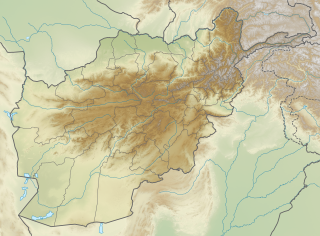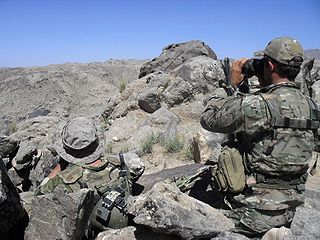 W
WThe following addresses the events in Northern Afghanistan between April 2009 and 2014. While this part of the country had long been relatively peaceful compared to the all-out war zones of the south and east, tensions would flare up again in 2008 when the German soldiers deployed to the area came under attack more often, leading to the deaths of the several soldiers. Previously hindered by national caveats, the deteroriating security situation prompted the German-led Regional Command North to launch a series of operations to take on the rising insurgency. Concerted operations began after an insurgent attack on PRT Kunduz within minutes of German Chancellor Angela Merkel's departure from a visit. Within two years, the German presence would be doubled and additional reinforcements from the American ISAF contingent were called in, including heavy German armoured vehicles and US aviation assets, allowing for a more aggressive approach towards the insurgency.
 W
WThe 2010 Afghanistan earthquake occurred on April 18 with a moment magnitude of 5.6. The earthquake could be felt in Mazar-i-Sharif, Kabul, and elsewhere in Afghanistan, as well as in Uzbekistan and Tajikistan. Eleven people were killed and more than 70 were injured. More than two thousand houses were destroyed.
 W
WOn 28 January 2010, an International Conference on Afghanistan was held at Lancaster House in London, where members of the international community discussed the further progress on the Petersberg agreement from 2001 on the democratization of Afghanistan after the ousting of the Taliban regime. The one-day conference, hosted by the United Kingdom, the United Nations, and the Afghan government, meant to chart a new course for the future of Afghanistan and brought together foreign ministers and senior representatives from more than 70 countries and international organizations. The conference was also attended by the Afghan president Hamid Karzai, the Afghan Minister of Foreign Affairs Spanta, the US secretary of state Hillary Clinton, UN Secretary General Ban Ki-Moon, UN envoy Kai Eide and the British Foreign Secretary David Miliband, as well as the former Afghan minister of finance Ashraf Ghani and the British prime minister Gordon Brown. Afghanistan agreed to timetables to take control of certain military and police functions, and launched a program to lure Taliban insurgents back to mainstream life with financial incentives.
 W
WOperation Moshtarak, also known as the Battle of Marjah, was an International Security Assistance Force (ISAF) pacification offensive in the town of Marjah, Helmand Province, Afghanistan. It involved a combined total of 15,000 Afghan, American, British, Canadian, Danish, and Estonian troops, constituting the largest joint operation of the War in Afghanistan up to that point. The purpose of the operation was to remove the Taliban from Marja, thus eliminating the last Taliban stronghold in central Helmand Province. The main target of the offensive was the town of Marjah, which had been controlled for years by the Taliban as well as drug traffickers.
 W
WPamir Airways Flight 112 was a scheduled passenger flight from Kunduz Airport, Kunduz to Kabul International Airport in Kabul, Afghanistan. On 17 May 2010, the flight was operated by an Antonov An-24 carrying 39 passengers and 5 crew when it crashed onto terrain. No one onboard made it out alive.
 W
WThe Afghan parliamentary election, 2010 to elect members of the House of the People took place on 18 September 2010. The Afghan Independent Election Commission - established in accordance with the article 156 of the Constitution of Afghanistan for the purpose of organizing and supervising all elections in the country - postponed the poll from its original date of 22 May to September 18.
 W
WThe Raid on Khataba, also referred to as the raid on Gardez, was an incident in the War in Afghanistan in which five civilians, including two pregnant women and a teenage girl, were killed by U.S. forces on February 12, 2010. All were shot when U.S. Army Rangers raided a house in Khataba village, outside the city of Gardez, where dozens of people had gathered earlier at the home to celebrate the naming of a newborn baby. Initially, U.S. Military officials implied the three women were killed prior to the raid by family members, reporting that the women had been found "tied up, gagged and killed." But investigators sent by the Afghan government reported, based on interviews and pictures of the scene, that the special operation forces removed bullets from the victims' bodies and cleaned their wounds as part of an attempted cover-up. NATO denied this allegation, and Afghan investigator Merza Mohammed Yarmand stated, "We can not confirm it as we had not been able to autopsy the bodies." The US military later admitted that the three women were killed by the special operations unit during the raid.
 W
WRoute Trident was built by the British Army's Royal Engineers in Helmand Province, Afghanistan. The construction of the road was codenamed Operation Lar Jarowel by the Ministry of Defence. Route Trident replaced an older road that was vulnerable to attack by insurgents on convoys supplying three patrol bases established in the Gholam Dastagir Kalay area as part of Operation Panther's Claw. In the immediate aftermath of operation the Light Dragoons Battlegroup were suffering casualties as they tried to secure the area and resupply their patrol bases. The attacks resulted in the deaths of two British servicemen and led to the cancellation of the convoys, forcing the bases to be resupplied by air.
 W
WThe 2010 Salang avalanches consisted of a series of at least 36 avalanches that struck the southern approach to the Salang Tunnel, north of Kabul. They were caused by a freak storm in the Hindu Kush mountains.
 W
WThe Battle for Sangin was an extended campaign during the War in Afghanistan. Third Battalion Seventh Marine Regiment initiated clearing operations. Third Battalion Fifth Marine Regiment continued and is credited with completing the clearing phase. Sangin is considered the bloodiest battleground of Afghanistan by both US and British alike. With both nations suffering the loss of over 100 killed in action, and several hundred moderate to severe casualties. The volatile campaign in the Sangin Valley has been extensively covered in the media by Wall Street Journal, Time, USA Today, and other publications.
 W
WThe Shah Wali Kot Offensive was a five-day joint operation during the War in Afghanistan, conducted by Australian special forces and the Afghan National Army with US air support, between 10–14 June 2010. The operation took place in the Shah Wali Kot District of Kandahar Province, occurring in preparation for the coalition clearance of the province and resulting in heavy insurgent casualties.
 W
WUnited Nations Security Council Resolution 1917, adopted unanimously on March 22, 2010, after recalling its previous resolutions on Afghanistan, in particular resolutions 1868 (2009), 1662 (2006) and 1659 (2006), the Council extended the mandate of the United Nations Assistance Mission in Afghanistan (UNAMA) until March 23, 2011 and realigned its mandate to assist with government-led recovery efforts.
 W
WThe war on terror, also known as the Global War on Terrorism and U.S. War on Terror, is an international military campaign launched by the United States government after the September 11 attacks. The targets of the campaign are primarily Sunni Islamic fundamentalist armed groups located throughout the Muslim world, with the most prominent groups being Al-Qaeda, the Islamic State, the Taliban, Tehrik-i-Taliban Pakistan, and the various franchise groups of the former two organizations. The naming of the campaign uses a metaphor of war to refer to a variety of actions that do not constitute a specific war as traditionally defined. U.S. president George W. Bush first used the term "war on terrorism" on 16 September 2001, and then "war on terror" a few days later in a formal speech to Congress. In the latter speech, George Bush stated, "Our enemy is a radical network of terrorists and every government that supports them." The term was originally used with a particular focus on countries associated with al-Qaeda. The term was immediately criticised by such people as Richard B. Myers, chairman of the Joint Chiefs of Staff, and more nuanced terms subsequently came to be used by the Bush administration to publicly define the international campaign led by the U.S. While it was never used as a formal designation of U.S. operations in internal government documentation, a Global War on Terrorism Service Medal was issued.